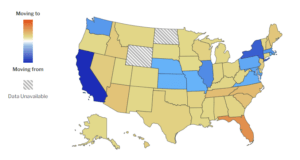Do you have a home equity loan or home equity line of credit (HELOC)? Homeowners often tap their home equity for some quick cash, using their property as collateral. But before doing so, you need to understand how this debt will be treated come tax season.
With the 2018 Tax Cuts and Jobs Act, the rules of home equity debt changed dramatically. Here’s what you need to know about home equity loan taxes when you file this year.
Acquisition debt vs. home equity debt: What’s the difference?
For starters, it’s important to understand “acquisition debt” versus “home equity debt.”
“Acquisition debt is a loan to buy, build, or improve a primary or second home, and is secured by the home,” says Amy Jucoski, a certified financial planner and national planning manager at Abbot Downing.
That phrase “buy, build, or improve” is key. Most original mortgages are acquisition debt, because you’re using the money to buy a house. But money used to build or renovate your home is also considered acquisition debt, since it will likely raise the value of your property.
Home equity debt, however, is something different.
“It’s if the proceeds are used for something other than buying, building, or substantially improving a home,” says Jucoski.
For instance, if you borrowed against your home to pay for college, a wedding, vacation, budding business, or anything else, then that counts as home equity debt.
This distinction is important to get straight, particularly since you might have a home equity loan or HELOC that’s not considered home equity debt, at least in the eyes of the IRS.
If your home equity loan or HELOC is used to go snorkeling in Cancun or open an art gallery, then that’s home equity debt. However, if you’re using your home equity loan or HELOC to overhaul your kitchen or add a half-bath to your house, then it’s acquisition debt.
And as of now, Uncle Sam is far kinder to acquisition debt than home equity debt used for non-property-related pursuits.
Interest on home equity debt is no longer tax-deductible
Under the old tax rules, you could deduct the interest on up to $100,000 of home equity debt, as long as your total mortgage debt was below $1 million. But now, it’s a whole different world.
“Home equity debt interest is no longer deductible,” says William L. Hughes,a certified public accountant in Stuart, FL. Even if you took out the loan before the new tax bill passed, you can no longer deduct any amount of interest on home equity debt.
This new tax rule applies to all home equity debts, as well as cash-out refinancing. That’s where you replace your main mortgage with a whole new one, but take out some of the money as cash.
For example, say you initially borrowed $300,000 to purchase a home, then over the course of time paid it down to $200,000. Then you decide to refinance your loan for $250,000 and take that extra $50,000 to help your kid pay for grad school. That $50,000 you took out to pay tuition is home equity debt—and that means the interest on it is not tax-deductible.
Limits on tax-deductible acquisition debt
Meanwhile, acquisition debt that’s used to buy, build, or improve a home remains deductible, but only up to a limit. Any new loan taken out from Dec. 15, 2017, onward—whether a mortgage, home equity loan, HELOC, or cash-out refinance—is subject to the new lower $750,000 limit for deducting mortgage interest.
So, even if your sole goal is to buy, build, or improve a property, there are limits to how much the IRS will pitch in.
When in doubt, be sure to consult an accountant to help you navigate the new tax rules.
-Realtor.com






